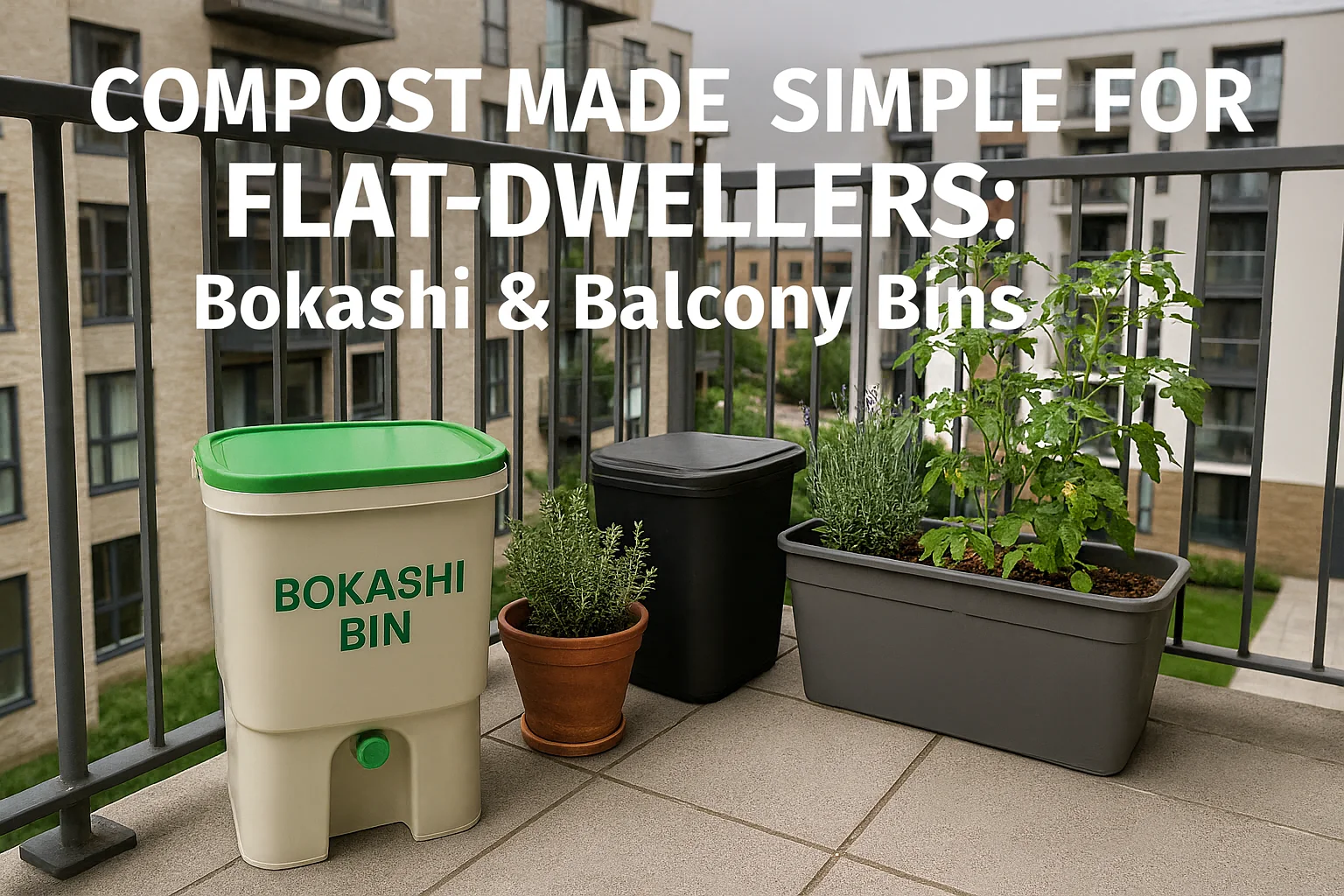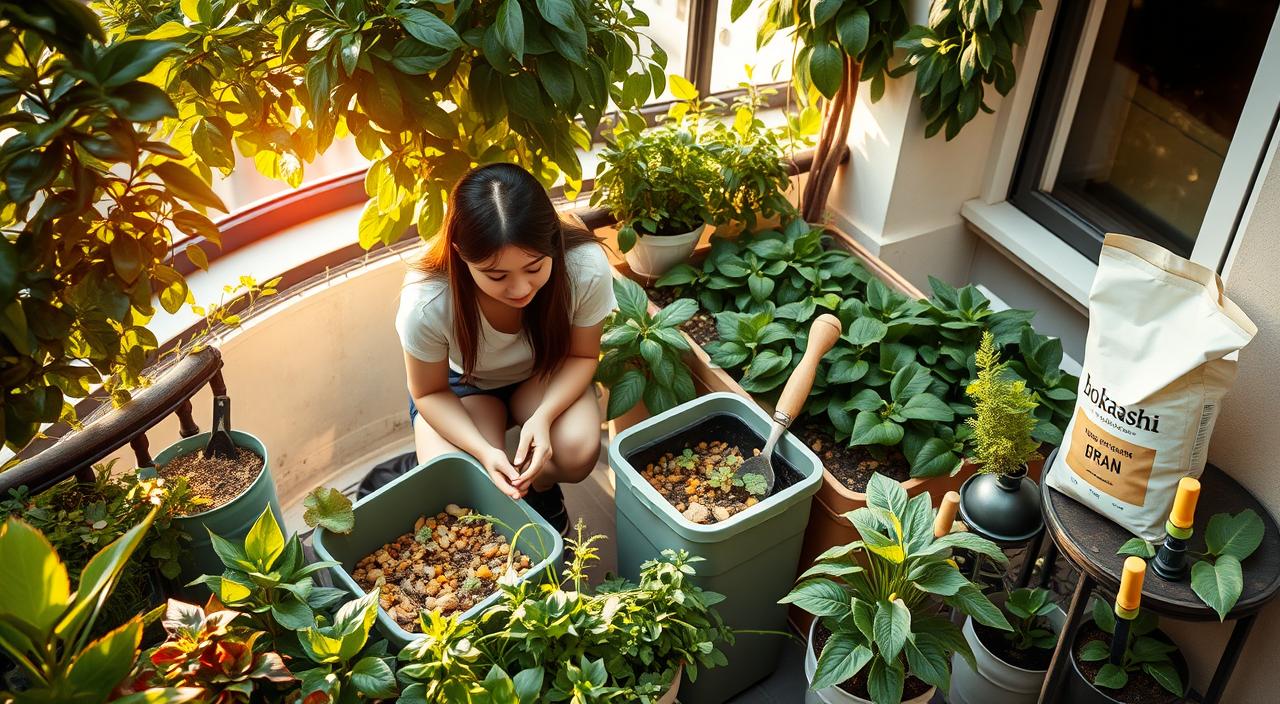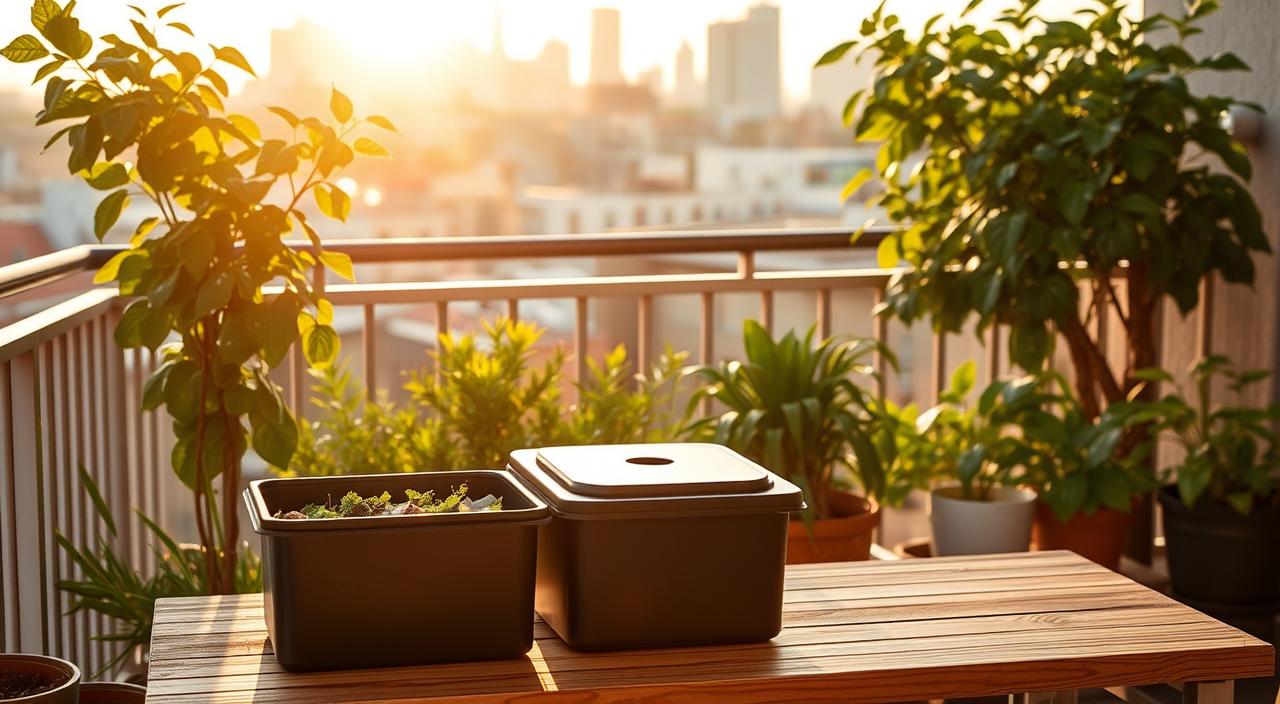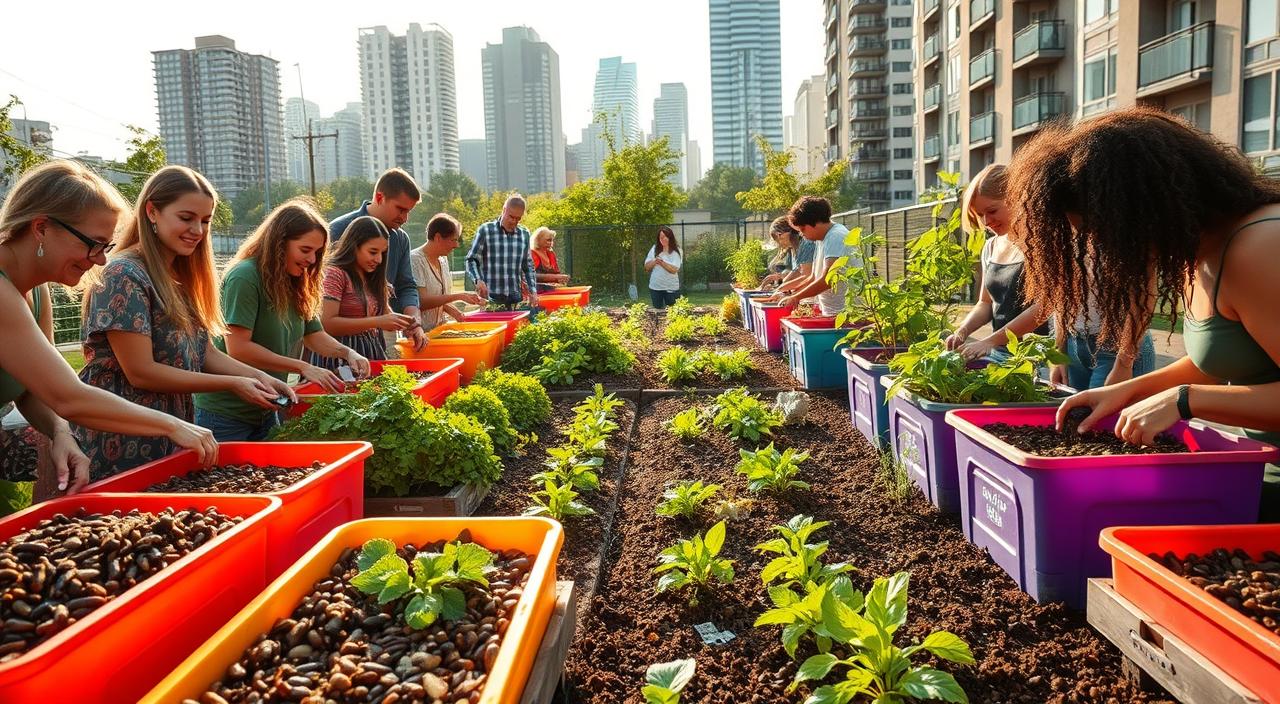
Living sustainably in a flat doesn’t mean giving up on eco-friendly ambitions. Many residents assume composting is impossible without a garden, yet creative systems prove otherwise. Compost made simple for flat-dwellers is about finding small-scale solutions—whether under the sink, on the balcony, or through community efforts.
Take Joy’s story. After moving from London to Australia, she faced a challenge: local councils offered little food waste collection. Determined to cut her landfill impact, she experimented with compact methods such as Japanese Bokashi fermentation and balcony compost bins. Her journey shows that even in high-rises, food scraps can become a resource rather than rubbish.

This guide explores practical, space-saving composting options for flats. Whether you’re a beginner or an experienced eco-enthusiast, you’ll find tested methods that suit limited living space, local council rules, and even unpredictable neighbours.
Key Takeaways
- Flat-dwellers can compost successfully with the right system.
- Bokashi fermentation and balcony bins are ideal for small spaces.
- Council food waste policies vary across London—adaptability is key.
- Diverting food scraps from landfill reduces methane and creates valuable fertiliser.
- Community composting schemes expand options beyond your flat.
Why Composting in Flats Matters
The UK generates over 9.5 million tonnes of food waste annually, much of it heading straight to landfill. In cities like London, where 81% of residents in boroughs such as Tower Hamlets live in flats, conventional garden compost heaps are unrealistic. Yet every flat-dweller who diverts food scraps helps reduce greenhouse gases and contributes to the circular economy.
Councils across the capital are improving organic waste collections, but coverage is inconsistent. Camden Council provides weekly food waste bins, while other boroughs rely on voluntary schemes. Having your own system means you’re not limited by postcode.
Understanding Your Space and Limitations
Before starting, assess what kind of composting system fits your flat:
- Balcony corner – great for small outdoor bins or worm farms.
- Under-sink storage – ideal for compact Bokashi bins.
- Shared spaces – useful for community bins, if building rules allow.
“My ninth-floor flat initially felt incompatible with organic recycling until I discovered fermentation bins that fit neatly under the sink,” says Alexandra from Tower Hamlets.
Adapting Methods for Small Apartments
Traditional compost heaps need airflow, soil contact, and outdoor space—things flats rarely have. Instead, closed systems thrive:
- Bokashi fermentation uses airtight bins and microbial bran.
- Balcony bins speed up decomposition with careful rotation.
- Worm farms process scraps into nutrient-rich liquid and compost.
Even a single compact bin can divert kilos of food waste each week, contributing to London’s Zero Waste by 2030 targets.
Bokashi: Fermentation Without the Fuss

Bokashi is a Japanese method that “pickles” food scraps using effective microorganisms. It works indoors, doesn’t need soil, and handles almost all food types—including cooked meals, citrus peels, and small bones that normal compost can’t digest.
How Bokashi Works
- Add food scraps in layers inside the bin.
- Sprinkle Bokashi bran over each layer.
- Seal tightly to create an oxygen-free environment.
- After 2–3 weeks, scraps ferment into a pre-compost mix.
The liquid by-product (“Bokashi tea”) can be diluted and used as a fertiliser for plants.
Common Issues
- Leaks or smells → caused by low-quality bins or poor seals.
- Black mould → indicates contamination; white mould is healthy.
- Too much liquid → drain regularly to prevent build-up.
Balcony Bins: Composting in the Open Air
If you have outdoor space, a balcony bin provides a simple alternative. These small containers allow scraps to decompose naturally, similar to a garden compost heap but on a smaller scale.
- Placement: keep in shade to avoid overheating.
- Rotation: turn weekly to aerate contents.
- Multiple bins: while one is decomposing, you can fill another.
Table 1: Comparing Bokashi vs Balcony Bins
| Feature | Bokashi Bin | Balcony Bin |
|---|---|---|
| Process | Fermentation | Decomposition |
| Waste Types | All food (including meat & dairy) | Plant-based only |
| Duration | 2–3 weeks | 4–6 weeks |
| Maintenance | Daily sealing | Weekly turning |
| Best Location | Indoors, under sink | Outdoor balcony |
Creative Composting Solutions for Flat-Dwellers
Vermicomposting with Worm Farms

Compact worm bins fit under kitchen counters or on balconies. Worms eat fruit and vegetable peels, coffee grounds, and cardboard. In return, they produce:
- “Worm wee” (liquid fertiliser for plants).
- Castings (nutrient-rich compost).
Tips for success:
- Avoid citrus, onions, and too much bread.
- Maintain moisture with damp cardboard.
- Keep in shade to regulate temperature.
Joy’s worm farm thrived even in 40°C Australian summers with simple shading and regular checks.
Community Composting
Not all scraps fit into personal bins. That’s where neighbourhood schemes help.
- Community gardens accept excess food waste.
- Apps like ShareWaste connect people with compost drop-off points.
- Some London tower blocks have shared compost bins with strict guidelines.
“Start solo, then collaborate,” advises a Shoreditch resident. “Shared bins only work when everyone understands the rules.”
Table 2: Composting Options for Flat-Dwellers
| Method | Space Needed | Waste Types | Pros | Cons |
|---|---|---|---|---|
| Bokashi Bin | Minimal (under sink) | All food scraps | Fast, odour-free | Needs Bokashi bran |
| Balcony Bin | Outdoor corner | Plant-based | Low cost | Limited food types |
| Worm Farm | Small indoor/outdoor spot | Veg & fruit | Produces fertiliser | Sensitive to conditions |
| Community Bin | Shared space | Mixed | Builds community | Risk of contamination |
Local Tips from London Residents
- Tower Hamlets: join council-supported food waste pilots.
- Camden: use weekly collection alongside home systems.
- Hackney: explore local community gardens for surplus scraps.
For more information on London’s official recycling policies, visit the Recycle for London website.
For bulkier garden clippings or when balcony bins can’t keep up, you can also turn to garden waste removal in London services that handle larger amounts of organic waste responsibly
Building Habits That Last
Composting in a flat isn’t about perfection—it’s about progress. Try starting with just one bin, then expand. Split scraps between systems:
- Ferment citrus peels in Bokashi.
- Compost veggie scraps in a worm bin.
- Share eggshells with a community garden.
Over time, your flat can become a hub of sustainable living. Neighbours may notice your thriving balcony herbs or the lack of rubbish bags at your door, sparking conversations and spreading habits further.
Conclusion
Compost made simple for flat-dwellers proves that small spaces don’t mean small impact. From Joy’s Bokashi experiments to Londoners’ balcony bins, urban composting is a practical, adaptable, and rewarding habit.
Every peel, shell, or coffee ground saved keeps waste out of landfill, enriches soil, and supports greener cities. By choosing methods that fit your lifestyle—whether fermentation, worms, or community partnerships—you’re part of a growing movement redefining sustainability in flats.
Start small, stay consistent, and celebrate each jar of compost you create. Your flat may be compact, but your impact can be huge.

 CALL NOW
CALL NOW